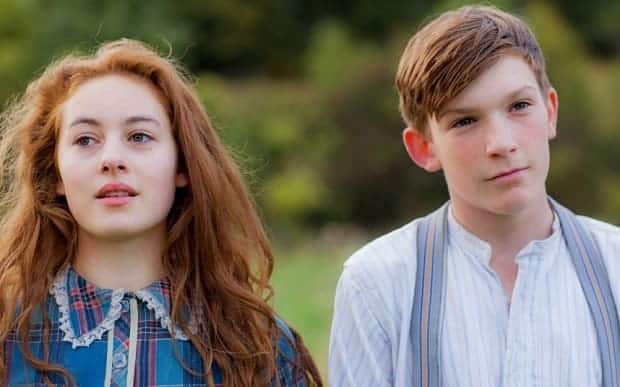Here is an analysis of each chapter in Cider with Rosie by Laurie Lee.
A general summary
In Cider with Rosie, Laurie Lee recalls his childhood and adolescence. He was one of seven children in a close family headed by his mother: he grew up in England, in a Cotswold village governed by tradition.
The book is organised in accord with his early exploration of his widening world. He examines his infant sensations, his cottage, his yard, his village and Cotswold Valley, then local superstitions, village education, his neighbours, public tragedies, private life stories, his childhood games, village celebrations, sexual initiations, and the eventual changes as his childhood, his close family life, and the traditional village life pass away forever.
Chapter 1: First Light
In this chapter, Lee gives a three-year-old’s perceptions and misconceptions: small about objects around him, Laurie crawls among “forests” of household objects and he believes autumn is a season and the war’s end means the end of the world. Lee uses metaphors and similes (often of water) to communicate the child’s sense of adventure.
This chapter introduces most of the themes that will be developed in the story throughout the different episodes of Laurie’s childhood: the importance of family ties, the constant presence and role of the women in his own development and the absence of a father, the magic in the world surrounding him causing numerous fears, the importance of the seasons and the overwhelming presence of nature and death.
Chapter 2: First Names
The second chapter is divided into three sections. It begins in a dark winter with peace and the men returning from war and it ends in the “long hot summer of 1921”. It roughly has to do with night-time feelings: dreams, terrors and superstitions.
The village legends: ignorance and superstition were common features shared by all the people of the village, and they led them to fear a world which seemed unpredictable and was governed by magic laws. Some animals or natural phenomena were given a particular meaning and there were ill omens that brought bad luck to those who crossed their path.
The village freaks: the freaks such as Cabbage Stump Charlie, Albert the Devil, Percy from Painswick… were all more or less physically or mentally peculiar. The reader might be surprised at the number of handicapped people who populate the area.
This phenomenon could be explained by the fact that there was so great mixing of the population, which led to the problem of consanguinity. Besides, diseases and malnutrition must have led to further handicaps. These freaks with their “cartoon” nicknames were probably the most striking and frightening people whom the little boy had heard of or seen in his narrow world.
The flood: the chapter ends then with another apocalyptic scene: the flood following a particularly dry summer. This part enables the narrator to emphasize the role religion played for the villagers at that time.
In their eyes, the world was driven by magic forces that could be influenced, either by appeals to god, the Christian God or if this did not work, by resorting to other methods: “As the drought continued, prayer was abandoned and more devilish steps adopted”.
Chapter 3: Village School
The third chapter focuses on Laurie’s school experiences, from his first day in the Infant Room to the day he left Miss Warldey’s Big Room forever. The realization that he had to leave the house one morning and go to school came as a shock.
This second stage in the process of growing up proved as frustrating and painful as the first one (leaving his mother’s bed): he discovered a world which appeared to be hostile, violent, and full of dangers.
It is as if his progressive discovery of the world followed a recurring pattern: shock, terror, the impression of being alone in a hostile world, and then a final, unexpected rescue when things seemed to be at their worst.
At school, Laurie learnt how to discriminate between right and wrong, which was his first step toward losing his innocence. The school was also the means through which tradition was perpetuated. It enabled the children to accept those who, for some reason, were different, by forcing them to mix.
Chapter 4: The Kitchen
In this chapter, he presents his home life – centred on the kitchen – on a typical day (using the same pattern as in other chapters), thus he catches the atmosphere which was predominant in his early childhood.
He emphasizes the importance of the light in the room and the necessity of a good fire. Laurie Lee’s mother’s behaviour around the fire suggests that keeping the fire alive is a question of life and death.
Chapter 5: Grannies in the Wainscot
Chapter 5 is devoted to the history of the Lee’s seventeenth-century Cotswold house. It was once a country manor, then a “public beer-house” or a pub, and it was later divided into three “poor cottages”.
In the other two cottages lived Granny Wallon and Granny Trill, two old ladies who were life-long enemies. Their death happened sometime during Laurie’s childhood.
Chapter 6: Public Death, Private Murder
The events recounted here (Vincent’s murder, Miss Flynn’s suicide and the death of old Mr Davies) date back to an early period of Laurie’s childhood. Following the recollection of those tragic events, the narrator reflects upon the values and beliefs of the people in this valley, insisting once again on the durability or persistence of ancient traditions and attitudes.
At that time, death was not directly feared. What the villagers seemed to fear most was the presence of ghosts, haunted spots, ominous sighs from the sky, and weird-looking creatures which were substitutes for death itself. The villagers’ metaphysical fear of death had shifted to other objects.
Chapter 7: Mother
A whole chapter is dedicated to Laurie’s mother. It encompasses her whole life, from her birth to her death, at which time the narrator was an adult. He insists on his mother’s personality and the characteristics that made her so unique, so exceptional.
It is no surprise that Laurie Lee’s mother should occupy the central chapter of the book: in the same way, she occupied the centre of his life when he was a child.
Chapter 8: Winter and Summer
Life in the village was dominated by two main seasons – Winter and Summer. In chapter 8, Lee condenses a childhood of summer and winter days into an account: one typical winter day and one typical summer day.
The chapter is constructed on a symmetrical plan: early morning lights and sounds, then outdoor activities, helping farmers with their cattle and playing with other boys, then roaming the countryside in the evening.
In the week before Christmas, they spent the evening singing Christmas carols in the whole area. Each section revolves around Jone’s pond, which is described at length.
Chapter 9: Sick Boy
This chapter is focused on young Laurie’s childhood illnesses. His family thought he would not survive. The narrator reminds us that death is part of a family’s daily life.
He also mentions, probably with some bitterness, the difference in attitude between his father and his mother when faced with one of their children’s death. The recurring illnesses had various consequences:
- they brought nightmares that spurred his imagination and made him aware that death was lurking close by.
- they gave him the impression that he was a survivor spared by fate, reinforcing his tendency to fantasize about being special or even superior, a king whose origin was somewhat mysterious.
- they enabled him to experience his environment more sensuously and this made him feel part of the universe on a grander scale. He had become universal, he possessed in himself the universality of Time and Space.
Chapter 10: The Uncles
This tenth chapter is devoted to “the true heroes of ‘his’ early life”. It covers much more than Laurie’s childhood in so far as it goes back to his uncle’s youth around the turn of the century and it ends with the narrator’s early adolescence.
The narrator portrays his uncles as partly freaks, partly figures of legends and partly monstrous creatures with super-human strength; at least they had the power to fascinate the boys as well as the people in the whole area.
They belonged to the past more than to the present. The First World War is seen as a turning point in Lee’s uncles’ destiny as well as in the world’s destiny. This period was the starting point of the disintegration of the British Empire, of its supremacy and its ruling values.
Besides, their exaggerated qualities, their oversized figures and personalities reveal that they filled a huge gap left by an absent father in the boy’s life.
Chapter 11: Outings and Festivals
This chapter presents family and village celebrations. It starts with Laurie’s oldest memory concerning celebrations in the village: the Peace Day Celebration in 1919 when Laurie was 5. It ends with the Parochial Church Tea and Annual Entertainment, which probably took place every year until Laurie left home.
For the Peace Day Celebration, the emphasis is put on the costumes. First Laurie did not like his. Then, at the end of the day, he was given a prize by the Squire and photographed and he felt very proud.
The second section deals with family outings such as the gathering of berries or the visit to Uncle Charlie.
The third part focuses on Annual Choir Outings. This episode allows Laurie Lee to underline the particular attitude of the villagers who were prone to criticizing what was “foreign”.
This narrow-minded vision of the world – what is familiar is superior to what is unknown – is part of a traditional attitude coming from a lack of experience and a lack of outside influence.
The Parochial Church Tea and Annual Entertainment allow Laurie Lee to make fun, with humour and tenderness, of the most common and unsophisticated features of his fellow villagers, concerning their appreciation of art and their idea of entertainment.
Chapter 12: First Bite at the Apple
This chapter focuses on Laurie’s first sexual experience. It covers the period when he was a teenager, roughly between the ages of 12 and 16. This episode leads to the narrator discussing village morality, crime and punishment.
He opposes the villagers’ tolerant attitude toward social and sexual transgression to modern and urbanised behaviour. What mattered was that the villagers functioned like a family who solved their problems within the group.
Part of this chapter is dedicated to the description of the sensations and emotions of puberty. This leads to the scene in the hay field which gives the book its title. This is the climax of the story, the episode of the shared drink of cider with Rosie Burdock.
It ends with Laurie’s loss of innocence, following the pattern of Adam and Eve’s original sin. All the ingredients are the same: an idyllic nature, the temptation by the female, the reference to the apple, the notion of knowledge and sexuality, and the subsequent fall.
Chapter 13: Last Days
In this last chapter, the narrator makes the end of his childhood coincided with the end of the traditional village life. This chapter deals with the end of Laurie’s childhood together with his first experience of love, the discovery of another planet meaning the end of the child’s innocence, the end of an innocent way of life, for a child, for a village, for a world.
His childhood is lost forever and his world is disintegrating: only through the miracle of literature, of memories turned into written words, will it be able to survive.


